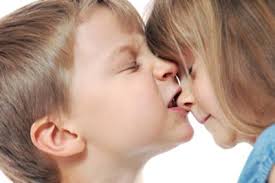How Can I Stop My Child From Biting ?

Most parents will at some point have the experience of having to respond to their child having bitten another playmate. It is very common and something that new parents should prepare for. In my experience, when a child bites once, you can sure enough bet that they will bite again. And it is often the same children that your child will target. This can be embarrassing if the biting is recurring time and time again. If you are looking for a fix to this problem we firstly need to identify the reasons behind the biting.
Why does my child bite?
There are a number of reasons why a child takes to biting other children or even adults. It is in fact a normal stage in their development.
1.Teething
The first time that a parent might expect their child to bite will be between the ages of 1-3 and this will be something that they will naturally grow out of. This is because they are in pain and biting and chomping on things gives temporary relief. It is something that still needs to be discouraged however, no matter how ‘normal’ it is.
Prevention: The baby market is swamped with teething aids. Some are more effective than others and it might take a bit of trial an error to find one that your baby takes to. Teething rings that can be frozen are particularly effective.
2.Exploration in Development
Just as babies will use their hands to explore the fascinating world they have found themselves in, they also use their teeth. There is nothing malicious about it, they are simply exploring what they see with all their senses. Every baby will try virtually anything in their mouths.
Prevention: This isn’t so easy to prevent. Making your child is aware that it is not okay to bite however, will eventually help them to learn not repeat this action.
3.Attention Seeking
As children grow a little older they will more than likely go through stages of craving extra attention from you or other adults such as their teachers. Biting is just one of the ways that gets children instant attention, perhaps the best way. It is a bad behaviour and definitely something to be concerned about. That is to say, parents and teachers should make every effort to be proactive in finding a way to prevent this from occurring again. The nature of the cause means that this will most certainly reoccur again and again. Often when new siblings come along or other big changes occur, children will experience a decrease in attention.
Prevention: Being aware of any major changes at home or at school will help to prepare carers that biting might occur. Make sure that your child is given enough of your attention in the daytime. Sharing a storybook, playing together outside, creating sensory play opportunities are all ways that will allow you spend quality time with your child. In the school and nursery environment teachers will need to be ready to separate your child from other children if there is an altercation over a toy etc. It is very common that children target the same one or two children, so it is a good idea to have these children play apart if altercations persist. As children grow older the more they will be able to understand. Showing them that you are very unhappy with their actions. Tell them that we do not bite others and explain that biting hurts.
4.Frustration
Just as with hitting, biting is a way for children assert themselves. Often in the classroom or nursery environment, sharing of toys causes most problems and arguments. It might be that your child just wants to be left alone to play by themselves. When children are young the only way they know to deal with these frustrations is to physically hurt the other child. Biting is one way that quickly communicates their feelings.
Prevention: Knowing your child is key to preventing situations like this from happening. Knowing which toys he/she likes most and their playing habits will allow carers to prevent a biting incident. It might be that a particular toy is simply better being removed completely from the environment. It is quite common at preschools for certain toys to be made removed as they are just too popular with the children! Frustration will eventually dissipate as your child grows older and develops speech. Likewise being able to talk to your child about what is the right and wrong way to deal with certain situations will help to guide them in the correct way. Your teacher will be doing this at preschool but make sure that there is also plenty of parental input at home.
5. Habitual Biting
If your child is still biting habitually at age 4+ there may well be some more serious psychological issues they are trying to deal with. In this case seeking professional help should be an option as serious injury and harm can happen to other children as a child gets physically bigger and stronger.
British Early Years Centre is an International Kindergarten and Preschool in Bangkok www.beyc.co.th
